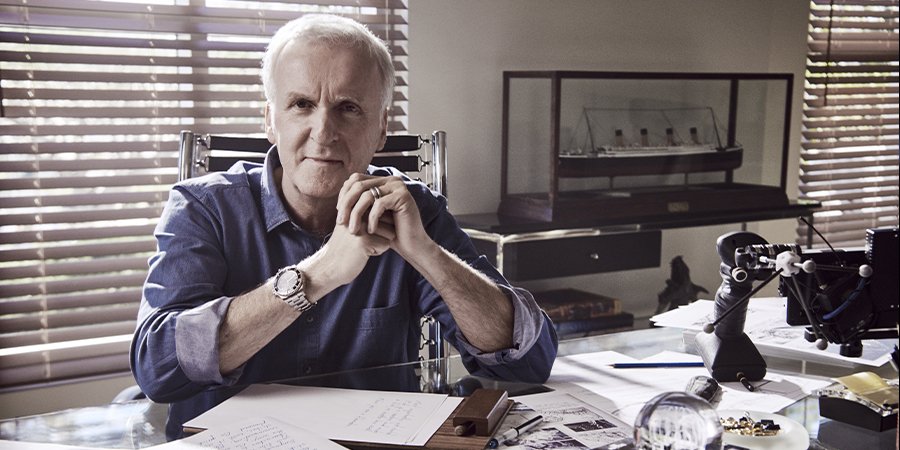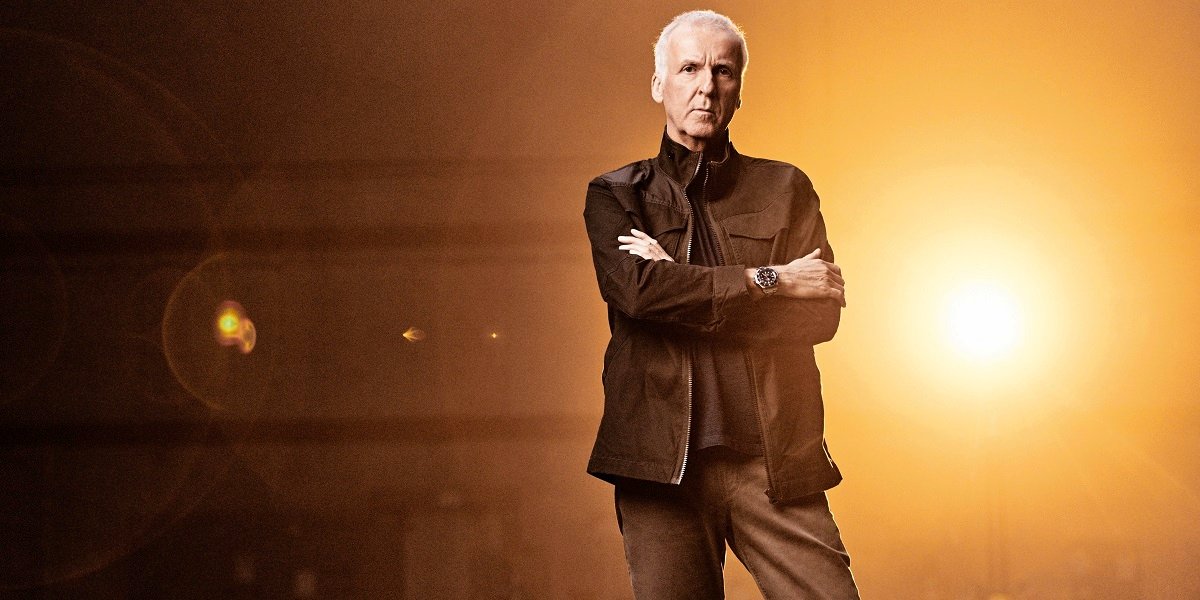As the director of the highest grossing film of all time, Cameron is definitely “king of the world.” Avatar has earned $2.7 billion at the box office alone and has changed the way Hollywood makes films. In the near future almost every studio blockbuster will be released in 3-D.
A conversation with James Cameron whose writing-directing credits include The Terminator, Aliens, The Abyss, Terminator 2: Judgment Day, True Lies, Titanic, and Avatar. He co-wrote and produced the new movie Alita: Battle Angel.
To have a conversation with James Cameron, you first have to catch him at sea level. That’s not easy. Given a few days to kill, the 63-year-old director of Avatar, The Terminator and True Lies would rather spend them flying one of his beloved helicopters or exploring the ocean floor in a submersible. (In 2012, he became the first person ever to make a solo expedition to the deepest place on earth, the bottom of the Marianas Trench, nearly seven miles down.) Lately, though, he’s been spending most of his time in a completely different solar system. To shoot his Avatar movies—he’s in the middle of simultaneous production on the second and third installments—Cameron invented a virtual reality camera that allows him to stroll around on the fictional planet of Pandora, amid the nine-foot-tall, blue-skinned natives, the sentient plants and the polymorphously deadly fauna.
Cameron, whose films have collectively earned more than $6 billion at the box office—and driven his personal net worth somewhere north of $700 million—isn’t much for idle chatter. When a producer showed up on one of Cameron’s sets trying to sweet-talk him into doing the studio’s bidding, the director told the man his interruption had cost $150,000 and dismissed him. (The movie, Titanic, went on to earn more than $2 billion.) But get him talking about any of his favorite subjects—his adolescent love of science fiction, his conversion to veganism, the various ways humanity might exterminate itself—and it turns out he has plenty to say.

Interview
You’re known for big action movies and blowing things up. But your newest project is a documentary series, AMC Visionaries: James Cameron’s Story of Science Fiction, for which you interviewed the likes of Steven Spielberg and Christopher Nolan. What made you want to delve into the history of sci-fi after working in the genre for so long?
Science fiction has been near and dear to my heart since I was a little kid. I had a very active imagination, and science fiction was a way for me to explore other worlds in my mind. There was nothing better than a story that had robots in it, or aliens, or flying saucers, other planets. I ate it up in every available medium at the time, which was usually paperback novels or black-and-white B movies from the late ’50s and some ’60s TV shows, like Lost in Space and The Time Tunnel. I rode a bus to another town to attend high school, an hour each way, and I usually read a book a day. All science fiction, of course.
Now science fiction is such a main pillar of our popular entertainment. I thought, I wonder how many people that are seeing these billion-dollar movies, whether it’s Transformers or the Marvel films, how many of them really know the roots of the idea of, say, an exoskeleton, a suit that makes you stronger? Everybody knows Iron Man, but where did that idea come from? Who knows where the concept of a time traveler comes from? Well, it comes from a book written in 1895 called The Time Machine. No one had ever thought of a time travel story before that. So I thought, let’s do a series where we trace how these ideas were developed and how the various subgenres changed depending on what was happening in the world—for instance, how dystopian and apocalyptic science fiction was very popular in the late ’50s, through the ’60s and into the ’70s, when you had so much social disruption and the Vietnam War and the threat of nuclear annihilation. Our angst always found an expression in science fiction.
You’ve made several movies set in dystopian or postapocalyptic scenarios. Do you think about those scenarios unfolding in real life?
Oh sure, absolutely. Yeah. There’s a part of my mind that’s very apocalyptic. I love looking at the past, seeing how empires rise and how they collapse until there’s nothing left but sand and some broken stones where once rose great cities. A way to profit from the lessons of history is to project forward false histories or simulations, if you will. That’s partly what science fiction does. I was a child of the Cold War. I remember at the age of eight or nine my dad reading pamphlets on how to build a fallout shelter during the Cuban Missile Crisis. When you grow up with that stuff you do have a bit of a jaundiced view of the permanence of the world. Frankly, we live in very challenging times right now. So I can project all kinds of very nasty outcomes.
On the other hand, as a parent, as a father of five, it’s my duty, if nothing else, to have hope. And I do have a certain hopefulness around our nature as human beings, as innovators. We’re very smart. We got ourselves into this pickle of modern civilization, with all its pitfalls and its built-in self-destruct buttons, like climate change and nuclear war, robotics, AI—all the things I like to make movies about. But we also got into it because we’re smart. We innovate. We invent. And we do have this thing called empathy. It’s a little bit in short supply right now in our country, but we have it. You put those two things together and there is reason for hope that we can keep on tap-dancing along into some amazing future we can’t even imagine yet.
“America is my adopted country in the sense that I’ve lived here 47 years and I’ve paid enough taxes to probably buy a squadron of fighter jets.”
One strand that runs through so many of your films, from The Terminator to Titanic, is hubris, the idea that humans aren’t as powerful as we think we are.
Classic science fiction theme, right? We’re smart enough to invent the nuclear weapon but not smart enough not to use it on ourselves. It goes back almost to biblical times, the idea of forbidden knowledge. That there are some things man was not meant to know. Or that we may have great intelligence but we lack wisdom. We’re kind of children.

Would you say your view of human nature is essentially positive or negative?
I think if there’s a theme for me, it’s that I’m very positive about the individual defying fate or standing in the face of doom or disaster, but I’m very negative about large numbers of humans together and the representation of authority, whether it’s the police in Terminator or the powers that be in Titanic that drove the ship onto an iceberg. I’m not especially fond of governments or authority systems.
You said our country needs more empathy. You are not a U.S. citizen, although you were about to become one in 2004, when you decided to withdraw your application out of unhappiness with the political direction of the country.
America is my adopted country in the sense that I’ve lived here 47 years and I’ve paid enough taxes to probably buy a squadron of fighter jets. It’s my country too, to some extent. And I think we are in desperate need of a little more empathy and compassion. As a nation here—and it’s happening all over the world—we’re sort of doubling down on this idea of “You’re all losers and we’re winners.” There’s a certain sense of entitlement, and a defensiveness and a mean-spiritedness to it. I’m not talking about everybody, but enough people to make a difference at the level of policy. But I don’t want to go into a big political discussion. Science fiction is a very good way to talk about politics and human systems, by extrapolating them to another planet or into a future where it doesn’t piss people off to read about them. You talk about people’s politics or religion and they get mad because they feel threatened. But you set it on another planet or in some alternate universe, and they can look at it with a more objective eye and maybe look at the world through another perspective, if only for a short time.
Avatar is unusual among current big-budget action/sci-fi franchises in that you came up with the story yourself. It’s not adapted from a comic book or a reboot of something from 40 years ago. Does it frustrate you that movies like that are crowding out more original stories?
I understand why it happens. I’m saddened it does happen. Movies are getting incredibly expensive. The rising tide has raised all the ships of visual effects together so that all movies look pretty damn good compared to what they looked like 10, 20 years ago. But that set a new expectation in the minds of the audience. They expect to be wowed every time they go to a movie theater. Shots that are thrown away left and right in movies now would’ve been the biggest, most amazing thing you ever saw 20 years ago. Middle-of-the-road visual-effects action films cost $100 million. The higher ones are $200 million and trending toward three hundred. The people who pull the trigger on these kinds of numbers want some sense there’s a footprint already out there in the popular consciousness. It’s a lot safer to spend money on Iron Man, Batman and Spider-Man than it is on, God forbid, a story that’s not from a comic book.
But you were able to get Avatar made.
We faced a challenge. I remember Tom Rothman, the cochairman of Fox at the time, saying “Avatar is just a word. It doesn’t mean anything to people.” And that was our uphill battle. Then the film opened, and people saw it and came back again, and it all worked out.
I’d say it worked out. Avatar grossed $2.7 billion.
No one was more surprised than we were.

You and your wife, Suzy Amis Cameron, also executive produced a new documentary about vegan athletes, The Game Changes. What inspired you to stop eating foods made from animals?
For my wife, it’s been mostly about health, the health of our children; for me it’s mostly about the environment, but we both see it as a win-win-win. As an individual, the very best thing you can do for the environment—and that’s everything from deforestation to biodiversity to climate change—is to just stop eating meat and dairy, and the best thing you can do for your health is to stop eating meat and dairy. Plus, I think the animals dig it too if you stop growing them by the billions and slaughtering them. It was so compelling for us, we literally thought about it for a day and then we went cold-turkey vegan almost six years ago.
The film looks at plant-based eating from a completely different perspective. It’s about performance. It’s about winning. We’re a society where people like to win. What if they’re all doing it wrong? And they are, by the way. The vegan athletes in this movie will prove it to you definitively.
“You talk about people’s politics or religion and they get mad because they feel threatened. But you set it on another planet or in some alternate universe, and they can look at it with a more objective eye.”
Speaking of technologies that have gone from sci-fi to reality, there are companies now that are growing edible meat from stem cell samples. If you could buy steak made without slaughtering anything or burning down any rain forests, would you go back to being a carnivore?
It doesn’t solve the problem, because it’s still meat. Where meat comes from is just the environmental problem. The health problem is it’s a type of protein that’s hard for the body to digest. It puts strain on the liver, it comes along with a lot of saturated fats, and there are elements of animal protein that are carcinogenic. The cells in your body don’t care if it’s grown in a lab or grown in a pasture.
Another technology that has crossed over is virtual reality. How do you think that will change society?
I think society is trending in general toward less real experience and more virtual experience. You live vicariously through your friends, through video games, through all our entertainment. As virtual realities become more real and more compelling, as they will, these alternative worlds are going to become more and more immersive and people are going to spend more and more time with them and less time connecting with each other directly, less time in physical activity, less time exploring the world as it really is. I happen to think that’s kind of unhealthy. On the other hand, it’s all market driven. I literally work in a virtual world all day long every day, and I’ll be doing it for the next seven years, assuming these films are successful, and I’ve been doing it for 12 years already. So virtual reality for me is no big thing. It’s just a tool. We don’t use goggles. I use a virtual camera. But that’s just the details of the interface. I walk around all day long in a world that surrounds me that’s an alien world, populated by alien creatures, and that’s how I spend my day.
Do you ever spend so much time in virtual environments during the day that you dream in them at night?
I think all dreams are dreaming in virtual space. You’re authoring the world and perceiving the world simultaneously, or at least in a very tight, closed loop. I think the original virtual reality is the dreamspace that we’ve all had since human consciousness awoke a couple hundred thousand years ago. Long before there was this thing called human civilization, our ancestors’ dreams were just as vivid as ours are now.
Alita: Battle Angel is powered by some extraordinary computer generated visuals. By what metric are you judging the success of these visuals?
Robert and my producing partner John Landau were mostly responsible for the finished work on the visual effects in Alita. I’d cast my eye over things every week. I’d do a quick run-through of all the shots that were in progress. I’d give notes where I felt it was necessary. But it was really up to them.
What kind of notes were you giving?
For example, the Motorball stuff was struggling, because it was the most pure CG sequence in the film. Everything else was more set-based — there was no set for Motorball, other than the bleachers and the crowd. Everything on the track was 100 per cent computer generated. I thought it was not quite at the reality levels of the rest of the film. I suggested a few small changes that I thought would punch it up. They were embraced and executed, and I think it helped. Now I think the sequence is spectacular. I didn’t give any notes or movement or dynamics or editing or anything like that. Robert is masterful at all that. But some of the CG stuff he’s done in the past — and he’ll readily admit this — had a whimsical, slightly cartoony quality to it, like in the Spy Kids movies.

